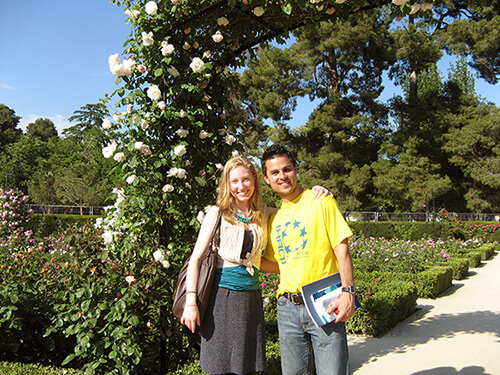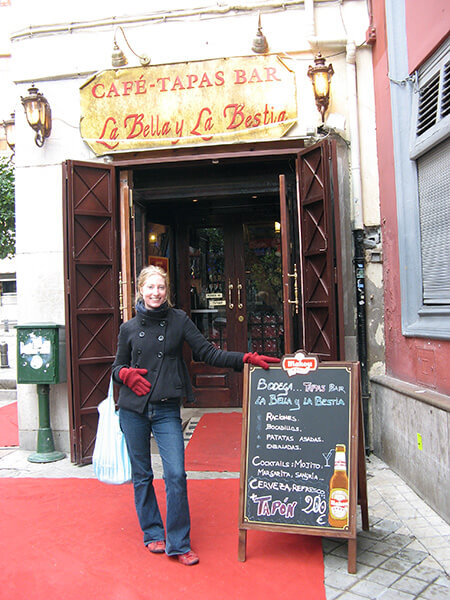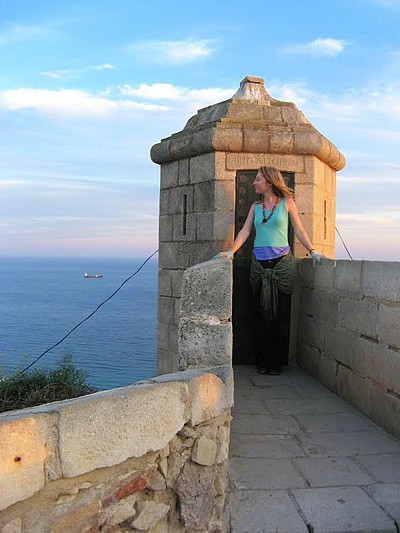|
Before, During and After: How to Prepare for your Departure and Return
Finding a Job in the Field of International Education
Article and photos by Jennifer Hare

|
|
Jennifer in a field of flowers in Cuenca, Spain.
|
So you have finally decided to do it — to embark on an adventure abroad and venture into the unknown. You are going to step out to find out. Now what? The myriad of planning details that await you can be daunting. Yet, with the appropriate pre-departure and reverse culture shock preparation, you will be much better equipped to deal with the challenges of studying and living abroad. In addition, I will share some tips for those interested in entering the field of international education as a future career path.
First, how on earth do you adequately prepare to immerse yourself in a completely different language and culture? Perhaps you’ve had no independent travel experience outside the U.S. and minimal exposure to your second language. Let’s face it: even at the upper-division university foreign language levels, you may be able to read Chinese or Italian novels and write stellar essays in Spanish, French, or Arabic, but you may feel conversationally deficient. Rest assured that your speaking and listening abilities will improve through immersion, but keep in mind that part of your preparation for living abroad (besides maintaining the innate curiosity and motivation that inspired you to go first) is cultivating an attitude of intercultural competence. This concept can be most easily defined as the capacity to see and understand the world from other perspectives, and it is a quality highly sought-after in the global job market. With a well-developed sense of intercultural competence, you will better discern and accept the differences between cultures, easily navigate new ideas and perspectives, and integrate other world views with your own. Intercultural competence development includes:
-
A change of self-perception and perception of others
-
Growth of autonomy, maturity, and objectivity
-
Establishment of intercultural friendships and relationships, whether personal or professional
-
Conscious inclusion of different cultural values
-
Greater active participation in global citizenship efforts and international community development
-
Achievement of an ethno-relative perspective, meaning you can understand your culture and way of being as just one of many — and not necessarily the right or the best way

|
|
Author in Retiro Park in Madrid with a friend.
|
There is also a concept not often addressed by U.S. institutions and study abroad programs: reverse culture shock and its ramifications. This concept posits that, upon return to one’s home country, a person experiences a rollercoaster period of euphoria, disorientation, frustration, acceptance, and assimilation that they underwent when they first arrived in a foreign country. Of course, this isn’t what you would expect because you’re returning to what is supposedly known and familiar — only you have been changed and transformed by your time abroad. People may expect you to be the same. This clash of identities can be a serious obstacle to overcome, among other challenges like feelings of alienation and wondering how to integrate your experience abroad into your daily life and future. Factors such as age and academic level, duration of stay in the host culture and amount of interaction, degree of similarity between home and host culture, and availability of a support network upon your return determine the length and intensity of reverse culture shock.
The good news is that reverse culture shock, like culture shock, does not last forever. As you learn to reintegrate into your home country's society, the optimal result is biculturalism or multiculturalism. Some suggestions for how to ease the reverse culture shock process and successfully integrate your newfound skills and abilities into your current life structure include the following:
-
Seek out an empathetic support system and make the most of existing resources. This might include your family, friends, church, study abroad alum network at your home institution, or other international groups or collaboratives where you live.
-
Find ways to continue pursuing new interests.
-
Take a language class or participate in a language exchange to maintain your language proficiency.
-
Become a tutor for students or adults who need help learning your first (or second) language.
-
Maintain exposure to your host culture through media outlets such as newspapers, music, and movies.
-
Attend an lecture series or other presentation on international affairs.
-
Rekindle your spirit of adventure and explore your home!
-
Most importantly, consider studying abroad the beginning of a lifetime of international and intercultural experiences.
At the very least, know that the qualities you have developed due to your experience abroad — intercultural competence, adaptability, language proficiency, stress management, and perseverance — are highly prized in the global context and will serve you well.

|
|
Author at a popular tapas bar in Granada, La Bella y La Bestia (Beauty & The Beast).
|
Speaking of the future, you may have already begun thinking about how to best use your skills and abilities in the workforce. Assume your experience abroad inspires you to pursue a career in international education. In that case, there are some practical measures you can take to increase your chances of securing a post-graduate job. International education includes professionals who work as study abroad advisors, international student advisors, recruiters, and English as a Second Language (ESL) teachers. My own interest in the field began after studying abroad in Spain for a year. It was solidified when I completed a year-long internship at Chemeketa Community College, working with international students. After that, I returned to Spain to earn my Master’s degree in Spanish through Middlebury College. Since returning to the States, I have worked as an International Student Advisor at Lane Community College in Eugene, Oregon.
The first thing I did when I realized that I could work with international students as a career path was to conduct as many informational interviews as possible. This concept applies to international education and to individuals in this field who are particularly passionate about sharing their professional trajectories and career wisdom with rookies. That said, they are busy individuals, so plan to have a 30-minute phone or in-person encounter and prepare your questions ahead of time, preferably aided with some web research of the institution where they work. After learning more about the field from them, you can ask if they’d be willing to review your resume and provide you with feedback and/or keep it on file for future job openings. An encounter like this can often lead to referrals, which eventually open the door to job interviews and full-time employment.
In the meantime, there are some concrete steps you can take to increase your appeal to prospective International Ed employers. After conducting a summer-long job search that involved more than 70 institutions and spanned 22 states and two continents (a standard feat for today’s competitive market), I would encourage you to consider the following:
-
Volunteer when and wherever possible in the field where you want to obtain work. To start, call up a local university or community college and ask about helping them with special projects, chaperoning an international student excursion, or assisting with a campus event or orientation. Other places to investigate are English language institutes and non-profit organizations geared towards the international education sector.
-
Attend a NAFSA conference. NAFSA is the world’s largest professional association of international educators, and its annual conferences in the spring draw thousands of attendees from around the globe. It’s a great place to network and learn more about the field through informative sessions — not to mention it looks good on your resume! Even if you cannot afford to pay the initial membership fee of $199, there are discount rates for students. You can cut your registration cost in half or more by volunteering your time while you’re there for simple tasks like registration and check-in, assisting in the Career Center, and greeting at special events. Lastly, if you are willing to invest a little more and are serious about honing your marketability, consider enrolling in one of NAFSA’s many pre-conference workshops on topics like Education Abroad Advising, F-1 or J-1 Student Advising for Beginners, Guidelines for Pre-departure and Arrival Orientations, Foreign Educational Credentials Analysis, Health & Safety in Education Abroad, or Fundamentals of Intercultural Communication. Suppose the high-volume bustle doesn’t sound like your cup of tea. In that case, you can also experience NAFSA on a smaller scale and budget at their regional conferences in the fall.
-
Expand your vision. While there is plenty of turnover within the field, it is competitive enough that you may not be able to secure an entry-level job in your state—or even in your preferred region of the country. Let the adaptability that you cultivated during your stint abroad influence your parameters. Relocating to a new state, area, or even country can be a rewarding experience that opens new doors for you, and it doesn’t have to be forever.
-
Invest in a Master’s degree. Countless veterans have informed me that the specific degree is not as significant as the fact that you have one. A recent trend has been the creation of Master’s degrees tailored for international education (such as SIT’s M.A. in International Education).
However, other joint Master’s degrees are in Business or Higher Education Administration and leadership. The golden key is to achieve that all-important balance of hands-on experience and theoretical training. Sometimes, work experience wins out, but more and more, the Master’s degree is your ticket.
I hope that these helpful hints will aid you in charting your unique course of personal, academic and professional growth. Your experience abroad will change you forever, and the best way to enjoy it is to be well-prepared for the before and after. You will be crossing a metaphorical bridge, but walk with confidence knowing that it has been trodden before and that there are abundant resources available to assist you every step of the way. In the meantime, let your spirit soar and bon voyage!

|
|
View from the Alicante coastline.
|
Jennifer Hare is a global nomad who has lived in six states and two countries. She currently resides in Oregon but remembers with nostalgia her two years in Spain (Granada and Madrid) and her travels to Canada, Mexico, Austria, France, Denmark, and Morocco. She enjoys photography, travel writing, jewelry design, idioms, Latin dance, food markets, and nature hikes.
|
